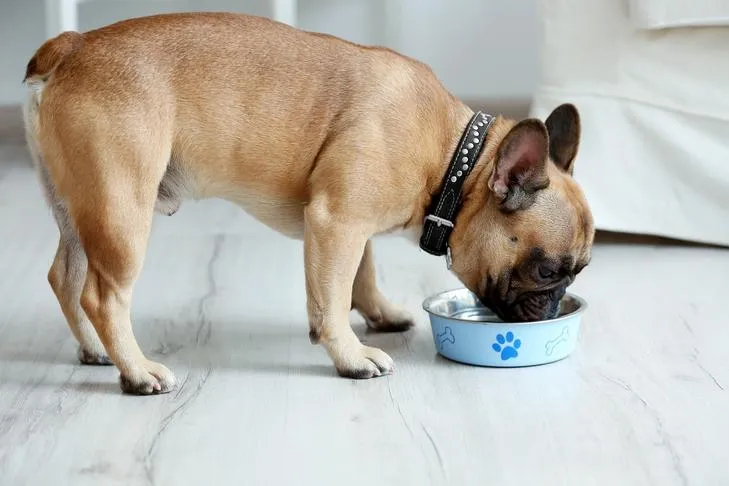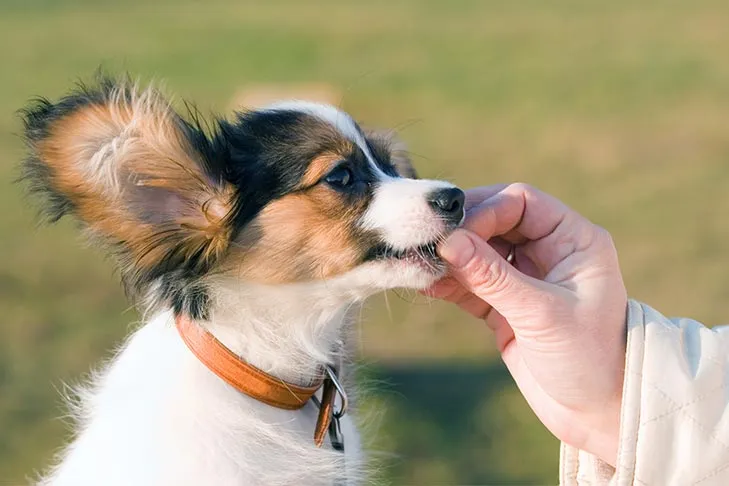Understanding what human foods your dog can and cannot eat is crucial for their health, safety, and overall well-being. As pet parents, we often want to share our meals with our beloved companions, but many common human foods can be harmful, or even toxic, to dogs. This comprehensive guide will walk you through a detailed list of human foods that are generally safe for your furry friend in moderation, along with those that pose significant risks and should be strictly avoided. Ensuring your dog’s diet is balanced and safe is a cornerstone of responsible pet ownership, and knowing the ins and outs of human food safety is a vital part of that responsibility. If you’re wondering what can I give puppies to eat or just what general foods are safe, this guide provides essential insights.
Safe Human Foods for Dogs: What You Can Share
Many human foods, when prepared correctly and given in moderation, can offer nutritional benefits or simply be a delightful treat for your dog. Always introduce new foods slowly and in small quantities to monitor for any adverse reactions.
Bread
Small amounts of plain, unseasoned bread are generally safe for dogs. It offers no significant nutritional benefits but won’t typically cause harm. The key is to ensure it contains no spices, artificial sweeteners, or toxic ingredients like raisins or garlic. Homemade bread, free from preservatives and additives found in many store-bought varieties, is a better option if you choose to offer it. However, bread is high in carbohydrates and calories, so it should be an occasional treat to prevent weight gain.
Cashews
Cashews can be a healthy snack for dogs when given in moderation. They contain beneficial nutrients like calcium, magnesium, antioxidants, and protein. However, like all nuts, cashews are high in fat. Excessive consumption can lead to weight gain or digestive upset. Always offer only plain, unsalted cashews, and limit the portion size to just a few nuts as a rare treat.
Cheese
Cheese can be a tempting and enjoyable treat for many dogs, provided they are not lactose intolerant. While uncommon, some dogs may experience digestive issues like gas or diarrhea if they consume dairy products. Opt for low-fat varieties like cottage cheese or mozzarella in small to moderate quantities. Cheese is high in fat and calories, so portion control is essential to avoid unhealthy weight gain. Many dogs also love dog-specific cheese chews, which are a safer, dog-friendly alternative.
 All American Dog looking at a piece of cheese on the kitchen table, highlighting a common human food dogs can eat in moderation.
All American Dog looking at a piece of cheese on the kitchen table, highlighting a common human food dogs can eat in moderation.
Coconut
Coconut, including coconut flesh, milk, and oil, can offer several health benefits for dogs. It contains lauric acid, which may have antimicrobial properties, helping to combat certain bacteria and viruses. Some pet owners also find coconut oil useful for improving bad breath and soothing skin conditions like hot spots, flea allergies, and itchy skin when applied topically or given orally in small amounts. Always ensure any coconut products you offer are unsweetened and the hard, furry shell is removed to prevent choking hazards or intestinal blockages.
Corn
Corn is a common ingredient in many commercial dog foods and is safe for dogs to eat. It’s a good source of fiber, vitamins, and minerals. If sharing corn, ensure it is completely removed from the cob. The cob itself is indigestible and can cause a serious intestinal blockage, requiring emergency veterinary intervention. Cooked, plain corn kernels are the safest option.
Eggs
Cooked eggs are an excellent source of protein, essential amino acids, and vitamins for dogs. They can be particularly soothing for an upset stomach. It’s crucial that eggs are fully cooked—scrambled, boiled, or poached—as raw egg whites contain avidin, an enzyme that can interfere with biotin absorption, potentially leading to a biotin deficiency over time. Never add seasonings like salt, pepper, or butter.
Fish
Cooked fish can be a highly beneficial addition to your dog’s diet, offering healthy fats and amino acids that support joint health, cognitive function, and a shiny coat. Salmon and sardines are especially noted for their omega-3 fatty acids. Sardines are unique because their small, soft bones are digestible and provide extra calcium. For all other types of fish, meticulous removal of all bones is vital, as they can splinter and cause internal damage. Always serve fish fully cooked and cooled, without any seasonings, and limit intake to no more than twice a week to avoid mercury accumulation.
Ham
While a small piece of plain, cooked ham might not harm your dog, it’s generally not recommended as a regular treat. Ham is high in sodium and fat, which can contribute to excessive thirst, stomach upset, and, in larger quantities, pancreatitis or other health issues. If you do offer a tiny bit, ensure it’s unseasoned and trim off any excess fat.
Honey
Honey is packed with a variety of nutrients, including vitamins (A, B complex), minerals (potassium, calcium, magnesium, copper), and antioxidants. Small amounts of local, raw honey may even help dogs with seasonal allergies by introducing small amounts of pollen, potentially building immunity. Beyond consumption, honey can also be used topically as a natural antiseptic for minor burns and superficial cuts due to its antibacterial properties. However, due to its high sugar content, it should be given sparingly.
 A French Bulldog enjoys a meal from its bowl at home, reminding owners to prioritize dog-specific nutrition over human foods.
A French Bulldog enjoys a meal from its bowl at home, reminding owners to prioritize dog-specific nutrition over human foods.
Milk
While puppies typically consume their mother’s milk, many adult dogs are lactose intolerant, meaning they lack the enzyme needed to properly digest lactose. A small amount of milk might be okay for some dogs, but owners should be vigilant for signs of intolerance such as diarrhea, vomiting, or gas. It’s generally safer to stick to water or offer specialized lactose-free pet milk if you want to give a dairy treat.
Peanut Butter
Peanut butter is a popular dog treat and a good source of protein, heart-healthy fats, vitamins B and E, and niacin. The most critical precaution is to choose raw, unsalted, unsweetened peanut butter. Always check the label carefully to ensure it does not contain xylitol, an artificial sweetener that is highly toxic to dogs and can cause a rapid drop in blood sugar, liver failure, or even death. A small spoonful is usually sufficient.
Peanuts
Unlike macadamia nuts (which are toxic), plain, unsalted peanuts are generally safe for dogs and offer healthy fats and protein. However, due to their high-fat content, moderation is key to prevent pancreatitis or weight gain. Avoid any salted or seasoned peanuts, as excessive salt is detrimental to canine health.
Popcorn
Unsalted, unbuttered, air-popped popcorn can be a safe and crunchy treat in moderation. It contains riboflavin, thiamine (beneficial for eye health and digestion), and small amounts of iron and protein. The most important rule is to ensure all kernels are fully popped to avoid choking hazards or dental damage from unpopped kernels.
Pork
Plain, cooked pork is a highly digestible protein source packed with amino acids. It can be a good alternative for dogs with sensitivities to other common proteins like chicken or beef. However, pork generally contains more calories and fat per pound than other meats, so it should be offered in moderation, with all excess fat and skin removed. Never feed raw or undercooked pork to avoid parasites.
Quinoa
Quinoa is a nutritious pseudo-grain that is rich in protein, fiber, and essential minerals. Its excellent nutritional profile makes it a healthy alternative to more common starches like corn, wheat, and soy, and it is increasingly found in high-quality dry dog foods. Cooked, plain quinoa is safe for dogs and can be a beneficial supplement to their diet.
 A fluffy Samoyed puppy rests peacefully in green grass, representing the vitality that proper dog nutrition from safe foods can provide.
A fluffy Samoyed puppy rests peacefully in green grass, representing the vitality that proper dog nutrition from safe foods can provide.
Salmon
As highlighted earlier, fully cooked salmon is a powerhouse of protein, beneficial fats (omega-3 fatty acids), and amino acids, boosting joint health, brain function, and immune systems. However, raw or undercooked salmon contains parasites that can cause Salmon Poisoning Disease, a severe and potentially fatal illness characterized by vomiting, diarrhea, dehydration, and lethargy. Always ensure salmon is thoroughly cooked to eliminate these parasites before feeding it to your dog.
Shrimp
Cooked shrimp, without the shell, tail, head, or legs, can be a healthy, low-calorie, and low-fat treat for your dog. They are rich in antioxidants, vitamin B-12, and phosphorus. Offer only a few pieces occasionally, ensuring they are fully cooked and completely peeled to prevent choking or digestive issues from the shell.
Tuna
Cooked, fresh tuna in small amounts can be a good source of omega-3 fatty acids, promoting heart and eye health. For canned tuna, choose varieties packed in water (not oil) and ensure it’s plain, without added spices or high sodium. Canned tuna can contain small amounts of mercury and sodium, so it should only be given as an occasional treat, not a dietary staple.
Turkey
Plain, cooked turkey meat is safe for dogs and a lean protein source. Always remove excess fat, skin, and especially bones, as poultry bones can splinter easily, causing blockages or tears in the digestive tract. Avoid any turkey prepared with excessive salt, seasonings, onions, or garlic, all of which can be harmful to dogs. For more information on what to give a Labrador puppy to eat, consider lean meats like turkey.
Wheat or Grains
Contrary to popular belief, grains are not inherently bad for most dogs. Grains like wheat, corn, rice, and oats are excellent sources of complex carbohydrates, protein, essential fatty acids, and fiber. Unless your dog has a diagnosed grain allergy or sensitivity (which is relatively rare compared to protein allergies), there’s no need to feed a grain-free diet. Consult your veterinarian if you suspect a food allergy.
Yogurt
Plain, unsweetened yogurt can be a perfectly acceptable and beneficial snack for dogs who can digest dairy. The active bacteria (probiotics) in plain yogurt can help support a healthy digestive system. Always choose plain yogurt without added sugars, artificial sweeteners (especially xylitol), or fruits that might be toxic to dogs. Start with a very small amount to check for lactose intolerance.
 A small Papillon puppy gently takes a treat from a hand, emphasizing careful portion control when feeding dogs human foods.
A small Papillon puppy gently takes a treat from a hand, emphasizing careful portion control when feeding dogs human foods.
Human Foods Dogs Should Never Eat: The Dangers to Avoid
It is absolutely essential for every dog owner to know which human foods are toxic or dangerous for dogs. Ingesting these items can lead to severe illness, organ damage, or even be fatal. If you suspect your dog has eaten any of the following, contact your veterinarian or an emergency animal hospital immediately. For a detailed list of what food is bad for a dog to eat, keep reading.
Chocolate
Chocolate contains theobromine, a stimulant that dogs metabolize much more slowly than humans. This means it can build up to toxic levels in their system. The darker the chocolate, the higher the concentration of theobromine and the more dangerous it is. Symptoms of chocolate poisoning include vomiting, diarrhea, restlessness, increased thirst, panting, tremors, seizures, and in severe cases, heart failure or death.
Grapes and Raisins
The exact toxic substance in grapes and raisins is unknown, but even small amounts can cause sudden kidney failure in dogs. All forms are dangerous, including raw, cooked, seeded, seedless, and products containing them. Symptoms can appear within hours and include vomiting, lethargy, diarrhea, decreased appetite, and abdominal pain.
Xylitol (Artificial Sweeteners)
Xylitol is a sugar substitute found in many sugar-free products like gum, candies, peanut butter, toothpaste, baked goods, and some diet foods. It is extremely toxic to dogs, causing a rapid and severe drop in blood sugar (hypoglycemia) and potential liver failure. Symptoms include vomiting, weakness, staggering, collapse, and seizures. Always check ingredient labels carefully before sharing any human food.
Onions, Garlic, and Chives
These alliums (part of the onion family) contain compounds that can damage a dog’s red blood cells, leading to anemia. Garlic is generally considered more potent than onions. Symptoms may include lethargy, weakness, pale gums, vomiting, diarrhea, and dark urine. Cooked, raw, or powdered forms are all toxic.
Avocado
Avocado contains persin, a fungicidal toxin. While generally considered a mild risk for dogs compared to other animals, large quantities, especially of the pit and skin, can cause vomiting and diarrhea. The pit also presents a choking hazard and can cause an intestinal blockage. It’s best to avoid feeding avocado to your dog.
Alcohol
Alcohol, in any form (alcoholic beverages, raw dough, some cough syrups), is toxic to dogs. Dogs are much more sensitive to the effects of alcohol than humans, and even small amounts can lead to alcohol poisoning. Symptoms include vomiting, disorientation, staggering, tremors, difficulty breathing, dangerously low body temperature, and coma.
Coffee, Tea, and Caffeine
Caffeine contains methylxanthines, which are toxic to dogs. Similar to theobromine in chocolate, caffeine can cause hyperactivity, increased heart rate, tremors, seizures, and even death. This includes coffee beans, grounds, brewed coffee, tea, energy drinks, and some dietary supplements.
Macadamia Nuts
Macadamia nuts can cause weakness, tremors, vomiting, fever, and depression in dogs. The exact mechanism of toxicity is unknown, but symptoms can last for up to 48 hours. While rarely fatal, they can cause significant discomfort and should be avoided entirely.
Cooked Bones
While raw bones can be part of some specialized raw diets (under strict veterinary guidance), cooked bones are extremely dangerous for dogs. Cooking makes bones brittle and prone to splintering, which can cause choking, mouth injuries, or severe internal damage, including perforations of the digestive tract or blockages. Always remove all bones from any meat you share.
Fat Trimmings
Excessive consumption of fat trimmings, both cooked and uncooked, can lead to pancreatitis in dogs, a serious and painful inflammation of the pancreas. Symptoms include severe abdominal pain, vomiting, diarrhea, and lethargy.
Yeast Dough
Raw yeast dough is dangerous because it can expand in a dog’s warm, moist stomach, causing painful bloating and potentially twisting of the stomach (bloat or gastric dilatation-volvulus, GDV), which is a life-threatening emergency. As the yeast ferments, it also produces alcohol, leading to alcohol poisoning.
Excessive Salt
While dogs need some sodium, too much salt can lead to sodium ion poisoning. Symptoms include vomiting, diarrhea, lethargy, tremors, high body temperature, seizures, and even death. Avoid feeding salty snacks like chips, pretzels, or excessively seasoned foods.
Other Potentially Harmful Foods
- Apple Cores and Seeds: Apple seeds contain cyanide, which is released if the seeds are crushed or chewed. While a few aren’t likely harmful, large quantities can be. The core can also be a choking hazard. Always remove seeds and core before offering apple slices.
- Cherries: The pits, stems, and leaves of cherries contain cyanide and are toxic to dogs. The fleshy part of the fruit is generally considered safe but offers little nutritional value.
- Mushrooms: While many store-bought mushrooms are fine, wild mushrooms can be highly toxic and extremely difficult to distinguish from safe ones. It’s best to avoid all mushrooms unless explicitly identified by an expert as safe.
- Rhubarb Leaves: Rhubarb leaves contain oxalates, which can cause kidney problems, vomiting, diarrhea, and tremors.
- Raw Meat and Bones (General Warning): While proponents of raw feeding exist, feeding raw meat and bones carries risks of bacterial contamination (e.g., Salmonella, E. coli) and parasitic infections, as well as the risk of choking or internal damage from bones. It’s generally safer to feed thoroughly cooked meats and bones appropriate for specific diets. For more information on what fruits and vegetables should dogs not eat and a broader overview of what are some foods that dogs can’t eat, refer to our dedicated guides.
General Guidelines for Feeding Human Foods to Dogs
Even with safe foods, responsible feeding practices are crucial:
- Moderation is Key: Human foods should only ever be a small percentage of your dog’s diet, accounting for no more than 10% of their daily caloric intake. Their primary nutrition should come from a high-quality, balanced dog food.
- Plain and Unseasoned: Always offer foods plain, without salt, sugar, spices, butter, oils, or any other seasonings.
- Proper Preparation: Ensure foods are cooked appropriately (if applicable), cut into bite-sized pieces to prevent choking, and free of pits, seeds, bones, or tough skins.
- Introduce Slowly: When introducing a new food, start with a very small amount and monitor your dog for any digestive upset or allergic reactions for 24-48 hours.
- Watch for Reactions: Every dog is different. What’s safe for one might cause issues for another. Be aware of any changes in your dog’s behavior, appetite, or bathroom habits.
- Consult Your Veterinarian: If you have any doubts about a specific food or if your dog experiences any adverse reactions after eating human food, always consult your veterinarian immediately. They can provide personalized advice based on your dog’s health, age, and breed.
Conclusion
Navigating the world of human foods for dogs can feel overwhelming, but with the right knowledge, you can confidently share safe and healthy treats with your canine companion while strictly avoiding dangerous ones. Prioritizing your dog’s health means being diligent about their diet, understanding the potential risks, and always erring on the side of caution. Remember that their primary diet should always be a high-quality, vet-approved dog food, with human foods serving only as occasional, carefully selected additions. For any concerns or specific dietary advice, never hesitate to reach out to your trusted veterinarian.
References:
- American Kennel Club (AKC) – https://www.akc.org/
- ASPCA Animal Poison Control Center – https://www.aspca.org/pet-care/animal-poison-control
